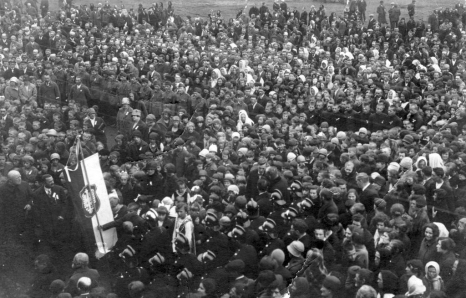
Rozwadian march to freedom
as of 7 November 2015.
Open-air exhibition prepared on the occasion of regaining independencePlace: Market Square in Rozwadów (Stalowa Wola)
The main theme of the exhibition is the historical event that took place on November 2, 1918, in the market square of Rozwadów. A patriotic procession heralding the emergence of a Free Poland involved a large crowd of townspeople, clergy, school youth, representatives of the newly appointed authorities, and organizations, including members of the Gymnastic Society “Sokół.” This exceptional moment was captured by an anonymous photographer. The patriotic fervor of the residents of Rozwadów and surrounding villages is presented against the backdrop of photographs documenting the immense destruction that the town suffered in 1914 and 1915. The exhibition is located just behind the existing exhibition dedicated to the history of TG “Sokół,” whose members were repeatedly involved in independence activities, and the building served as a bastion of Polishness in the town.
Galicia was the first to liberate itself from foreign rule. As early as mid-October 1918, meetings and demonstrations predicting the fall of Austria and the rise of a free Poland were held in Rzeszów, Kolbuszowa, Nisko, and Tarnobrzeg. The first demonstration in Rozwadów occurred on October 27, 1918. The Sunday rally began with a service during which Father Bruno Moskal delivered a sermon calling on the residents of Rozwadów to unite in the effort to rebuild their homeland. After the procession, the demonstrators gathered in the building of the Gymnastic Society “Sokół,” where urgent discussions about the safety of the residents continued until late at night.
On Sunday, November 2, 1918, thanksgiving services were held in nearly all churches of the Miechocin deanery. At the Capuchin monastery in Rozwadów, a Mass was celebrated by Father Michał Dukiet. After the Mass and a speech by Michał Jękot – a representative of the Rozwadów burghers, the ceremonial procession of Rozwadów residents and delegations from surrounding villages set off towards the market square. The ceremony continued in the building of Rozwadów “Sokół.” On the same day, a service was also held at the Jewish synagogue. At the beginning of November 1918, the Municipal Committee was established in Rozwadów, responsible for governing the town. Its members included lawyer Jan Jaroszewski – chairman, Dr. Antoni Tokarz, Emil Rudziński, Ludwik Ciołkosz, Michał Jękot, Bartłomiej Litwin, Paweł Serwacki, Jan Dudziak, Karol Kroczek, Ignacy Szwakop, Henryk Lewinger, and Jan Kuraś – secretary of the municipality.
The announcement of free Poland was not only marked by patriotic ceremonies. The change of power was accompanied by political dilemmas, social and national conflicts, and often by looting and violence. Anarchy, chaos, and lawlessness in the district – as noted by the Capuchin chronicler – lasted several weeks.
To ensure the safety of the residents of Rozwadów, a civic militia was established in the town. Captain Dudziak was put in charge of public property in Rozwadów, and the former captain of the Austrian army, Józef Nowak, oversaw the military. Excesses particularly occurred on market days. During one intervention, a man was accidentally killed, prompting the peasants to retaliate by killing a militia officer, Adam Wyżykowski. Armed gangs also harassed Jews; the animosity towards Jews that had accumulated over the years primarily had an economic basis, but they were also accused of supporting Bolshevism and attempts to introduce it to Poland. Antisemitic incidents continually escalated, leading to the departure of more than half of the Jewish citizens from Rozwadów.
Echoes of the Tarnobrzeg Republic from Rozwadów:
On November 5, 1918, a meeting of peasants and local political activists was held in the hall of Rozwadów “Sokół.” During this meeting, a national assembly was announced for November 6 in Tarnobrzeg. One of the heroes of those November days was Dr. Jan Jaroszewski – a socialist supportive of the peasant movement. Before World War I, he worked in Rozwadów as a lawyer, then served as the chairman of the Municipal Commission, and after the elections to the City Council, he became the Government Commissioner of the City of Rozwadów.
Jan Jaroszewski drafted the resolutions adopted by the Tarnobrzeg assembly that took place on November 6, 1918. These resolutions laid the foundation for the so-called Tarnobrzeg Republic, led by Tomasz Dąbal and Father Eugeniusz Okoń. The central slogan of the Republic’s authorities became the words: “power for the people, land for the peasants.” At the beginning of 1919, the Republic was dissolved. Dr. Jaroszewski resigned from his legal practice in Rozwadów in 1921 and likely moved to Poznań. In 1926, he was still mentioned as a lawyer in the court in Leszno, after which there are no further records of him.